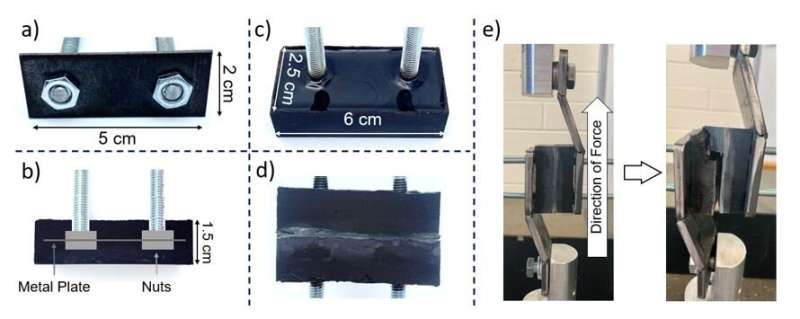When waste materials can build bricks to save money and resources

Firing bricks and making mortar and cement is very costly, but organic chemists at Flinders University are working on more sustainable alternatives—focusing on building materials made from waste products.
In another move into the circular economy, researchers from the Flinders Chalker Lab have used low-cost feedstocks to make lightweight but durable polymer building blocks which can be bonded together with an adhesive-free chemical reaction.
Their latest study tested the strength of these materials and explored ways they can be reinforced in construction.
Matthew Flinders Professor of Chemistry, Justin Chalker, says the need to develop sustainable building materials is increasingly important, with cement, iron and steel production accounting for more than 15% of global CO2 emissions each year.
“In this study, we tested a new type of brick we can make from waste cooking oil, mixed with sulfur and dicyclopentadiene (DCPD). Both sulfur and DCPD are byproducts of petroleum refining.
“The bricks bond together without mortar upon application of a trace amount of amine catalyst.
“All the starting materials are plentiful and can be classified as industrial waste.
“This research is part of a larger effort to move towards a sustainable built environment,” says project leader Professor Chalker.
The Chalker Lab’s new polymer research team at Flinders University’s College of Science and Engineering is collaborating with Clean Earth Technologies for further development. scale-up and possible commercialization.
The latest study, published as a cover feature in a special issue on Sustainability in the journal Macromolecular Chemistry and Physics, expanded the research to test the new bricks’ mechanical properties and look at ways to reinforce them in construction, including with carbon fiber fillers.
Chalker Lab research associate Dr. Maximilian Mann says as well as repurposing waste materials into value-added construction materials, the polymer bricks’ sulfur-sulfur bond means they can be bound together without mortar like traditional building method.
“The bonding in this novel catalytic process is very strong, producing a sustainable construction material with its own mortar which will potentially streamline construction,” Dr. Mann says.
Maximilian Mann et al, Chemically Activated SS Metathesis for Adhesive‐Free Bonding of Polysulfide Surfaces, Macromolecular Chemistry and Physics (2021). DOI: 10.1002/macp.202100333
Citation:
When waste materials can build bricks to save money and resources (2022, July 28)
retrieved 28 July 2022
from https://techxplore.com/news/2022-07-materials-bricks-money-resources.html
This document is subject to copyright. Apart from any fair dealing for the purpose of private study or research, no
part may be reproduced without the written permission. The content is provided for information purposes only.
For all the latest Technology News Click Here
For the latest news and updates, follow us on Google News.

